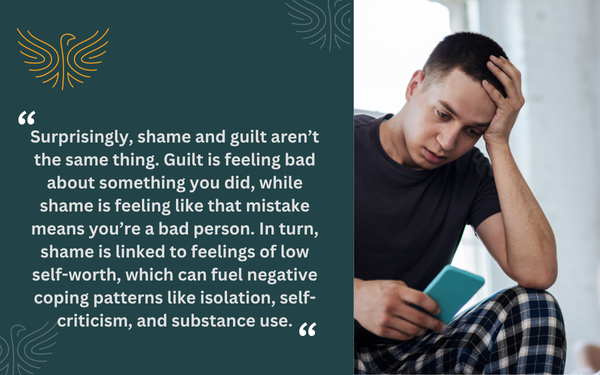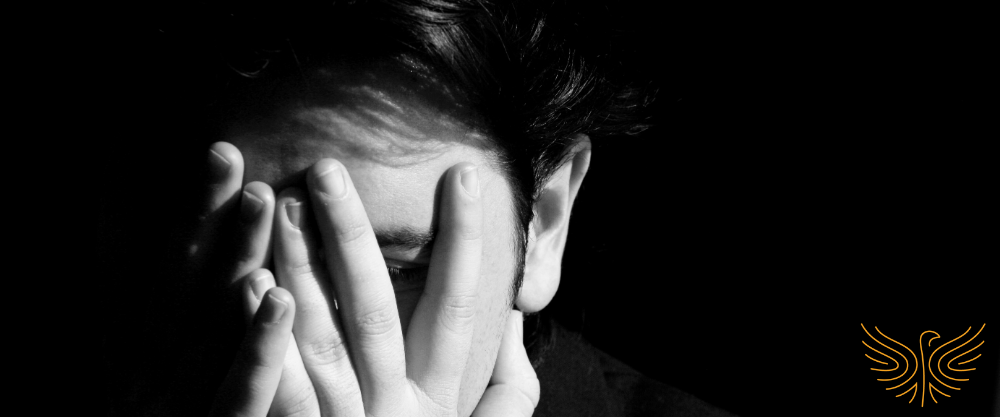Shame is an emotion we all feel from time to time. This feeling is intensely painful and happens due to the belief that we have done something immoral or improper and, thus, aren’t worthy of love or belonging. However, you are worthy!
Yet, shame and addiction often go hand-in-hand. This emotion can make it difficult to find purpose or see your own potential, even after you’ve achieved sobriety. In fact, throughout recovery, it’s very common to struggle with shame. So, why is this the case? And how can you overcome it? Below, we take a closer look.
_______________________________________________________
Why Is Shame So Difficult to Overcome?
Surprisingly, shame and guilt aren’t the same thing. Guilt is feeling bad about something you did, while shame is feeling like that mistake means you’re a bad person. In turn, shame is linked to feelings of low self-worth, which can fuel negative coping patterns like isolation, self-criticism, and substance use.

In many situations, shame leads to drug use as a means to escape. This can create and reinforce a vicious cycle that is hard to break. But not impossible.
Interestingly, shame is often linked to other mental issues, like depression. In some cases, this means that addressing these underlying issues or trauma can help overcome this feeling.
At the same time, the feeling of shame can also make it more difficult to reach out for help when you need it the most. It may lead to:
- Social withdrawal and isolation: You begin avoiding others due to feelings of unworthiness. This can sever ties or make close relationships difficult.
- Declining self-worth: Many addicts feel they aren’t deserving of help.
- Hide the truth of your addiction: If drug use goes unacknowledged, it’s unlikely you’ll seek out help.
- A lack of goals: You may not feel it’s possible to achieve your dreams, and as though your life will never amount to anything.
However, while the above feelings are valid, it’s possible to overcome shame. And while you might not feel worthy, you are. At Freedom Recovery Centers (FRC), we can love you until you learn to love yourself again. Recovery is possible, and shame is a normal and common part of the process. Yet, you can break free from it.
_______________________________________________________
Does the Feeling of Shame Ever Go Away?
Yes. In short, shame can go away—especially when it’s acknowledged, talked about, and worked through. It may not disappear overnight, but with time, self-compassion, and the right support, those intense feelings can fade and lose their power.
Recovery isn’t just about staying sober—it’s also about healing your relationship with yourself. That means learning to replace shame with understanding, forgiveness, and hope. With therapy, community, and continued growth, you can start to see yourself not through the lens of past mistakes, but through the strength it took to move forward.
Here are the ways rehabilitation programs, such as those at FRC, can help you move through and past shame:
Learning Self-Compassion
Substance abuse often arises due to feelings of low self-worth or other mental struggles. However, learning to show yourself the same kindness you would a friend can go a long way in obtaining self-love and overcoming and accepting feelings of shame.
Talking About It in a Safe Place
Within therapy groups and one-on-one therapy sessions, you’re offered a safe environment to talk things through. Ultimately, shame often thrives in isolation and silence. But talking about it can help you take your power back.
Challenging Negative Self-Talk
It’s easy to critique ourselves. But with time and patience, you’ll learn to replace harsh and negative thoughts with positive and growth-oriented ones. This can help you move past negative emotions and toward recovery and healing.
Addressing the Root Cause
Shame typically stems from trauma, past abuse, and unmet emotional needs. Peeling back the layers and addressing the root cause of these feelings can help you find relief and pave your way toward a healthier and happier life—where substance use no longer holds you back.
Reconnecting With Others
With shame, it can feel natural to withdraw from social experiences and isolate. However, this often makes things worse. By connecting with others going through similar, you can begin to restore your sense of belonging and worth.
Setting Achievable Goals
Building your confidence back up is an important factor in recovery. But this doesn’t have to involve complex ideas. Instead, start with small, achievable goals. By setting and accomplishing them, you can prove to yourself that you are worthy and that you have the potential to do something more.
Celebrating Every Win
Each step marks a powerful milestone. Even reaching out for help is a win all in itself. Any step forward is important, and worth celebrating (even if that simply means acknowledging it or briefly patting yourself on the back).
Are you struggling with shame due to substance abuse? This is normal, and our team at FRC is here to help you through it. Call us at 804-635-3746 or fill out our online form.
.svg)






.svg)

.svg)



.svg)
